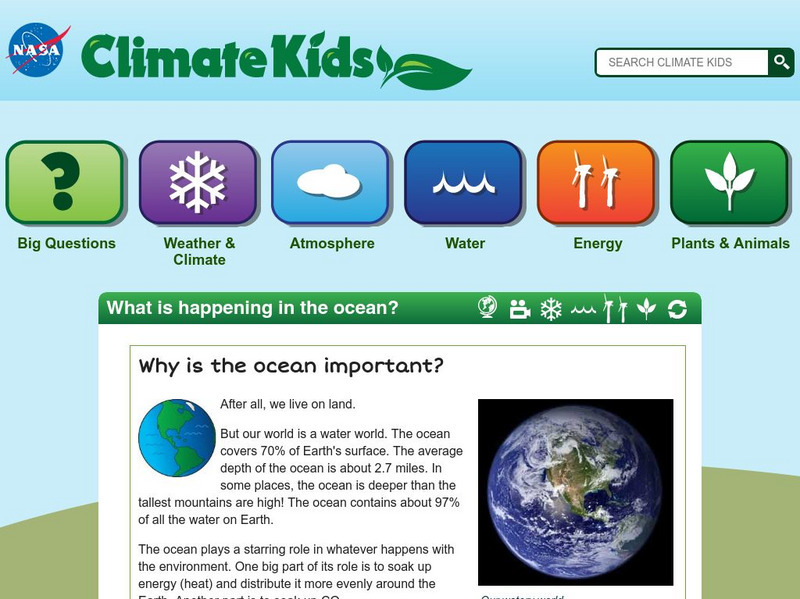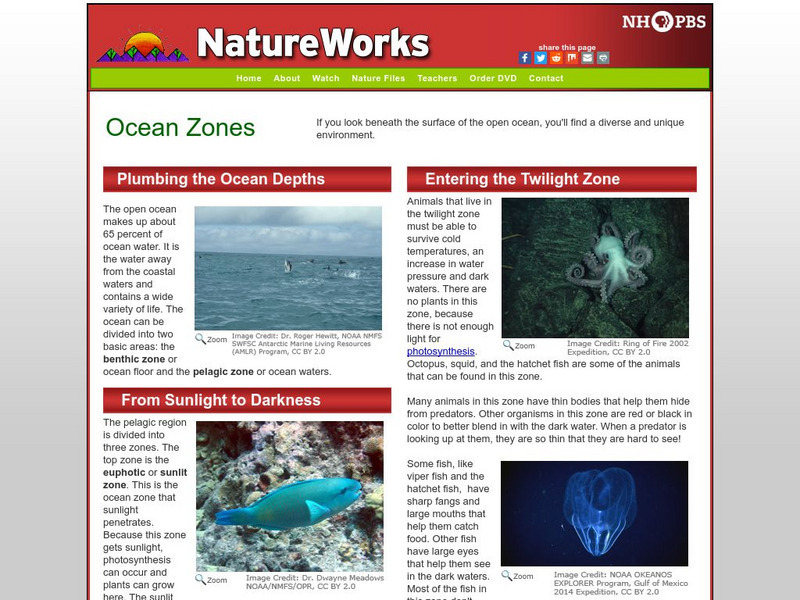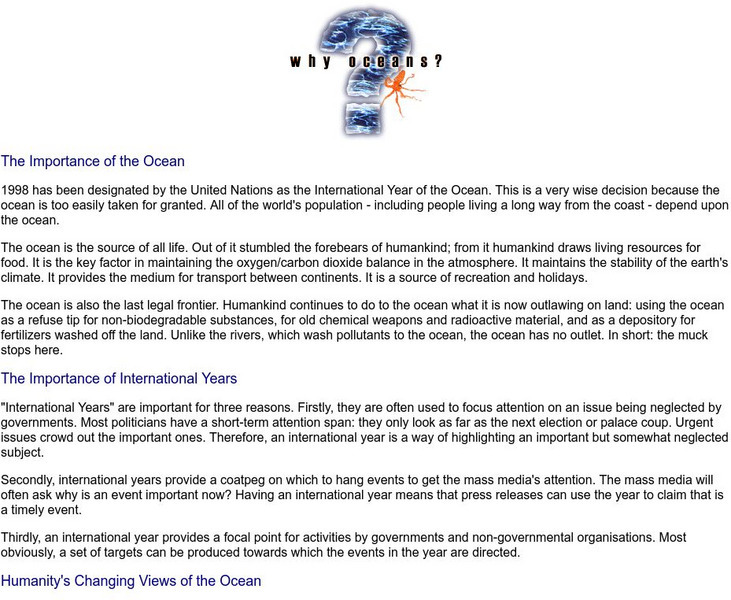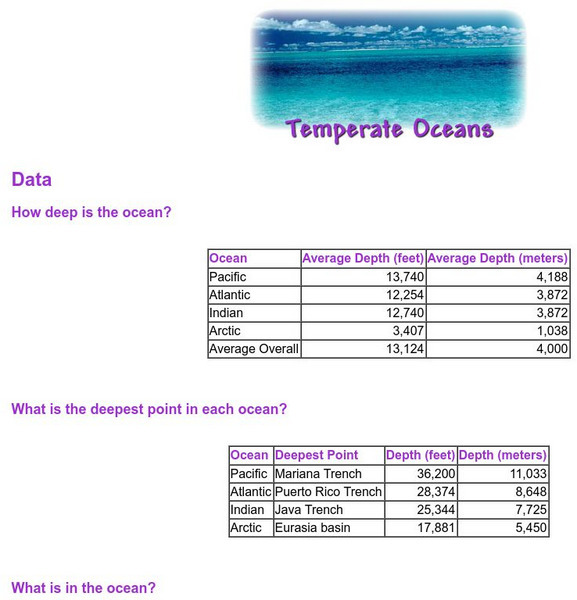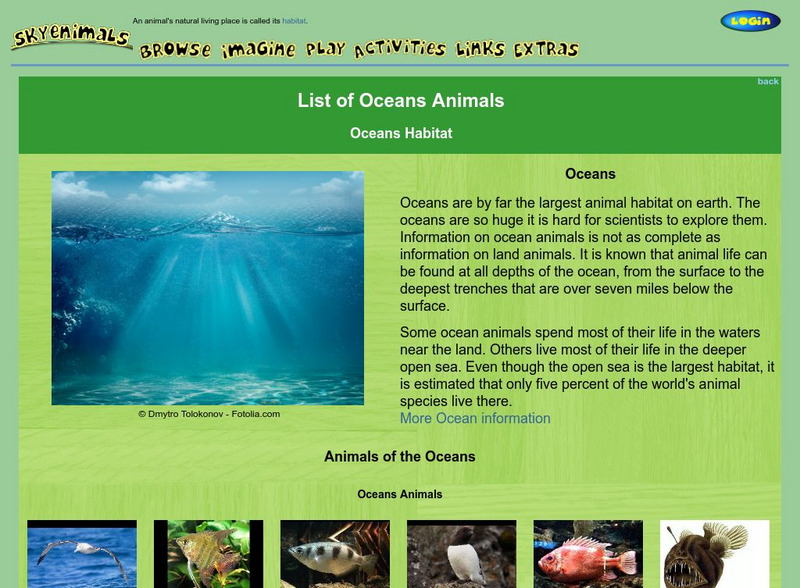Hi, what do you want to do?
NASA
Nasa: Big Questions: Oceans
Learn more about the oceans that cover so much of our planet. Five big Q and A's are addressed including why oceans are so important, how oceans soak up energy and gases, the relationship between climate and oceans, and the function of...
PBS
Nh Pbs: Nature Works: Ocean Zones
Discover more about the underocean environment at this site that surveys animals, environmental factors such as light and temperature, currents, animals, plants, and the like.
Tech4Learning
Pics4 Learning: Images for Education: Lighthouses
Contains beautiful lighthouse photos to use as references. Teachers and students will find this resource helpful as a source of inspiration, or information. Although the photos only contain a small amount of text, any of these twenty-six...
PBS
Pbs Learning Media: What Causes the Gulf Stream?
This video segment adapted from NOVA uses satellite imagery to illustrate the Gulf Stream's path and animations to explain how atmospheric phenomena cause it to move. [1:51]
PBS
Pbs Learning Media: The Water Planet
75% of our earth is covered by water. Water can be found in oceans, lakes, rivers, groundwater, and sea ice. View these captivating photos of our earth showing the different water sources and images of our earth taken by NASA. Background...
CK-12 Foundation
Ck 12: Second Grade Science: A World of Ice and Water
[Free Registration/Login may be required to access all resource tools.] Covers different bodies of water, including rivers, lakes, and oceans.
National Geographic
National Geographic: Your Ocean
This site provides a lesson plan for educators to use when teaching about the Ocean. In addition, there are many other related links and information about the ocean.
Other
Ocean Oasis: Field Guide
Ocean Oasis is a giant-screen film that depicts Mexico's Sea of Cortes and the Baja California desert. This companion site features much of the information the film has, such as beautiful images of animals, water, and land that have...
Discovery Education
Discovery Education: Curriculum Center: Science
The Discovery Channel provides numerous topics that are the most popular science topics taught in upper elementary and middle school. Content is organized by topics (Bacteria, Oceans, Solar System, etc.); all topics include quick facts,...
American Museum of Natural History
American Museum of Natural History: Sea Snow O Logy Card
OLogy cards are like virtual baseball cards about all kinds of science topics. This one is about sea snow and it contains information about what it is and where it is found.
Alabama Learning Exchange
Alex: Researching the Oceans of the Earth
This unit is a result of collaboration between the librarian and the 5th grade Science teacher. The Ocean Unit developed by the librarian is hands-on research in various areas of the library utilizing print, software and Internet access....
Alabama Learning Exchange
Alex: Diverse Life Forms of the Ocean
This lesson allows students to view and draw conclusions on the importance of life in the ocean. It uses student created movies to explore what is going on, as well as identifying the zones and diverse life associated with the oceans....
Khan Academy
Khan Academy: Infographic: Chemical Abundances: The Oceans
The chemical composition of our oceans varies depending on location, but the primary ingredients are oxygen, hydrogen, chlorine, and sodium. View this downloadable infographic on the earth's oceans.
Other
Young Ocean Explorers
This amazing website brings the ocean direct to your computer with high-quality, fact-filled videos. Articles answer everything you ever wanted to know about the ocean.
CK-12 Foundation
Ck 12: Earth Science: Importance of the Oceans Study Guide
A quick review of the importance of oceans on Earth.
University Corporation for Atmospheric Research
Ucar: El Nino Southern Oscillation
Learn how the El Nino-Southern Oscillation (ENSO) climate fluctuation affects weather around the world.
CK-12 Foundation
Ck 12: Earth Science for Middle School
This digital textbook covers core earth science concepts and includes interactive features, real-world examples, videos, and study guides.
Australian Broadcasting Corporation
Australian Broadcasting Corporation: Why Oceans?
This site, which is provided for by the Australian Broadcasting Corporation, gives an article on the importance of the ocean. Everyone on earth depends upon the oceans. Learn why oceans are important and what Australia is doing to help...
Missouri Botanical Garden
Missouri Botanical Garden: Temperate Oceans
Easy data tables compare the ocean depth of the four oceans, list the deepest point in each ocean, and list how much of different elements are contained in the oceans.
Missouri Botanical Garden
Missouri Botanical Garden: How the Ocean Refreshes Itself
Watch the animated illustrations to see how the nutrients at the bottom of the ocean get circulated to the top. This upwelling is necessary in order to maintain a healthy ocean.
Missouri Botanical Garden
Missouri Botanical Garden: Food From the Sea
Did you know that 80% of the fish we eat comes from the ocean? Since oceans cover so much of the earth you would think that we would never be in danger of running out of its resources. Learn how overfishing is causing many problems with...
Encyclopedia of Earth
Encyclopedia of Earth: What Is a Tsunami?
Short explanation of what a tsunami is. (Updated: May 7, 2012)
Other
Monroe County Women's Disability Network: Maps & Globes: Water Forms
This site is provided for by the Monroe County Women's Disability Network. Some basic information about water on our planet and the various water forms that make up three-quarters of the earth's surface. Includes some simple quizzes to...
Other
Skyenimals: List of Ocean Animals: Ocean Habitat
Learn about the largest animal habitat on Earth with this website that gives facts and images of the ocean habitat. Site contains pictures and images of ocean animals.





